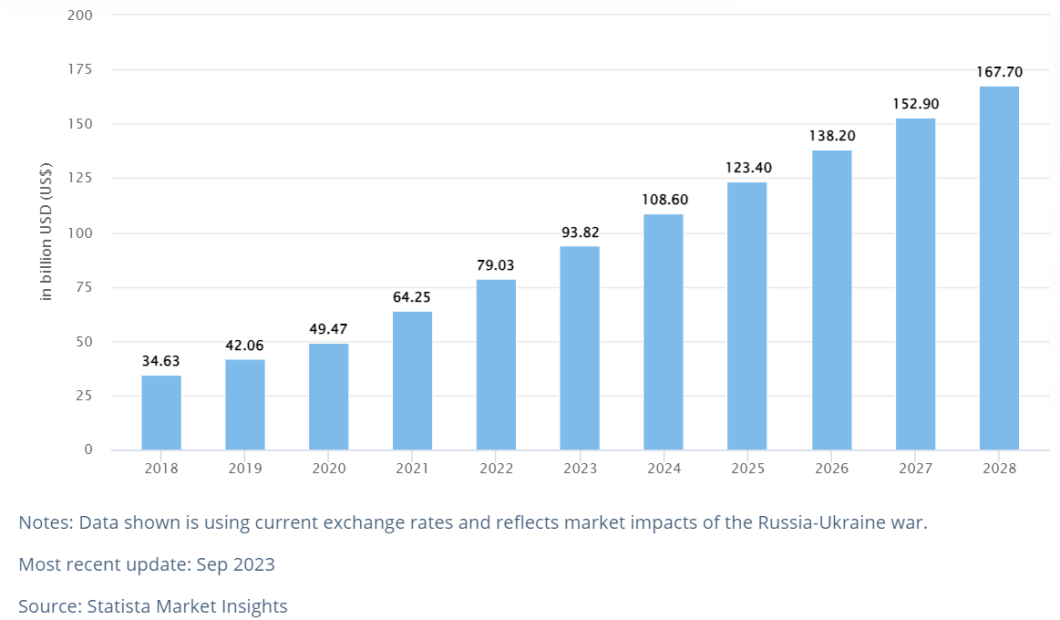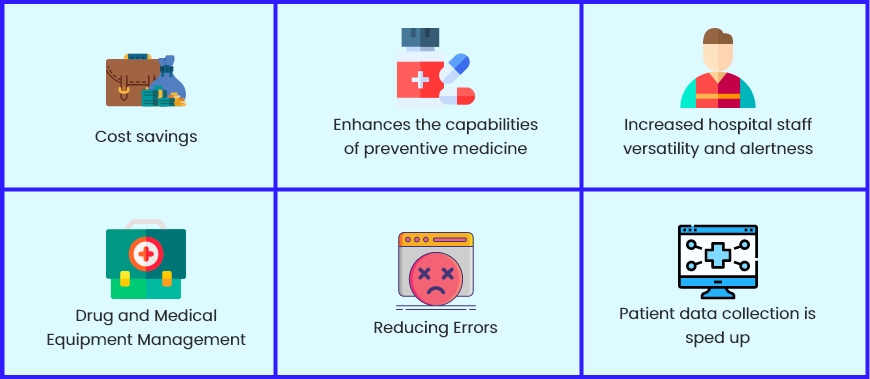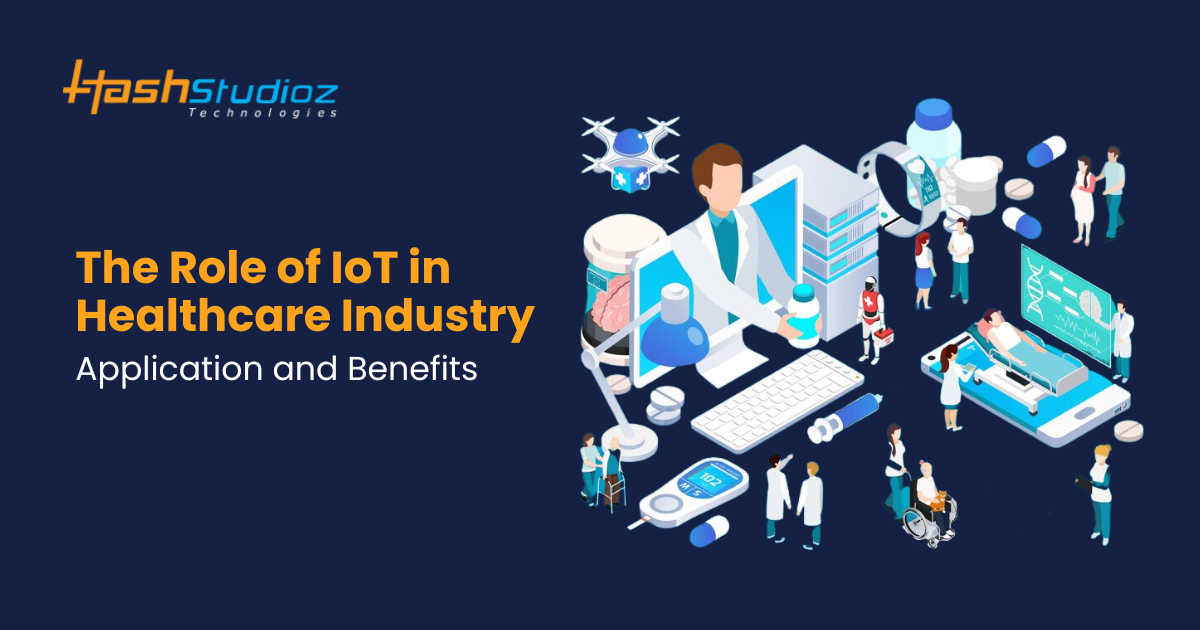Remote patient monitoring has reduced hospital admissions by up to 30% and emergency visits by nearly 40%, while telemedicine services now achieve patient satisfaction rates as high as 85%. These numbers highlight the powerful impact of IoT (Internet of Things) in healthcare.
Previously, patients could only connect with doctors through appointments, video calls, or text messages. This limited interaction made it difficult for doctors to monitor ongoing health conditions or make informed decisions. Real-time health data from smart devices allows doctors to monitor vital signs continuously, boosting medication adherence by up to 30%. The overall IoT healthcare market, valued at $44 billion in 2023, is expected to reach $305 billion by 2032, reflecting the sector’s rapid transformation.
Table of Contents
- Internet of Things (IoT) Applications for Healthcare:
- How Healthcare is Transforming Through the IoT Technologies
- Key Applications of IoT in Healthcare
- Benefits of IoT in Healthcare
- How IoT Helps In Healthcare, What Process It Follows
- IoT has since launched a range of wearables and accessories that have made patient’s lives easier. The following are the devices:
- Major Benefits of IoT in Healthcare
- The Future of IoT in Healthcare
- How HashStudioz Technologies Drives IoT Innovation in Healthcare
- Why Choose HashStudioz Technologies?
- Conclusion
Internet of Things (IoT) Applications for Healthcare:
The Internet of Things has the potential to fully improve healthcare for all the stakeholders in the ecosystem including but not limited to patients, medical practitioners, caretakers, hospitals, and insurance companies.

How Healthcare is Transforming Through the IoT Technologies
1. IoT for Patients -The Internet of Things has changed people’s lives, especially the lives of elderly patients, by allowing them to track and control their health conditions and issues. This has a huge impact on single persons and their families. When a person’s daily activities are moved, an alarm system sends warnings to family members and informed healthcare.
2. IoT for Medical Practitioners – Medical practitioners can keep better track of their patient’s well-being by using wearables and other IoT-enabled home surveillance devices. They will keep track of whether or not patients are sticking to their recovery schedules, as well as whether or not they need emergency medical attention. IoT allows healthcare providers to be more vigilant and compassionate in their interactions with patients.
3. IoT for Hospitals – The Internet of Things can be used in a wide variety of medical instruments, including wheelchair users, heart monitors, nebulizers, oxygen supplies, and other power storage devices.
Key Applications of IoT in Healthcare
1. IoT for Patients
IoT devices have significantly improved the quality of life for patients, especially elderly individuals and those with chronic conditions. Devices such as wearables and monitoring sensors help patients track their health metrics, like heart rate and blood pressure, and even manage daily activities.
2. IoT for Medical Practitioners
IoT enables doctors to remotely monitor patients’ health, ensuring adherence to treatment plans and detecting emergencies promptly. This allows medical practitioners to provide more personalized and timely care.
3. IoT for Hospitals
IoT technologies enhance operational efficiency in hospitals by streamlining processes such as equipment tracking and infection control. IoT-enabled devices ensure that hospitals maintain optimal hygiene levels, reducing the risk of infections.
4. IoT for Health Insurance Companies
Insurance companies use IoT data to assess claims, identify fraud, and optimize underwriting processes. Data from wearable devices allow insurers to better understand patients’ health, offering more tailored insurance packages.
Benefits of IoT in Healthcare

1. Cost savings: IoT provides for real-time patient tracking, reducing the amount of unwanted medical appointments, hospital stays, and re-admissions.
2. Enhances the capabilities of preventive medicine: Using IoT software, we can obtain a better understanding of the patient’s condition and react accordingly. Instead of waiting for symptoms to appear, doctors may use the information obtained to detect changes and easily resolve any concerns. For these reasons, the use of neural networks for data analytics under large amounts of IoT data is acceptable.
3. Increased hospital staff versatility and alertness: This is one of the most important IoT benefits of healthcare that would benefit frontline workers. In the case of a pandemic influenza epidemic, a growing number of patients may need urgent medical assistance.
4. Drug and Medical Equipment Management: Healthcare providers can use IoT and medical software for medical practitioners to remotely verify whether a patient has taken their medications and if they haven’t, the therapist can call and inform the patient, or even simplify the procedure.
5. Reducing Errors: Usually, results turn wrong, or the doctor works an incorrect test or conclusion. In medicine, the social aspect may have important consequences. This is generally avoided with IoT due to checks and balances. The device can have the best performance in terms of diagnostic accuracy.
How IoT Helps In Healthcare, What Process It Follows
Imagine tiny, invisible helpers keeping a watchful eye on your health. That’s the magic of Internet of Things (IoT) devices in healthcare!
1. Gathering Information: Imagine a smartwatch that feels your pulse or a smart patch stuck to your arm that measures your temperature. These are just some examples of sensors, which act like tiny detectives, constantly collecting data about your health. They can track things like heart rate, blood sugar, sleep patterns, and even medication intake.
2. Doctor’s Notes: Sometimes, doctors and nurses might also add information to the mix. They might use special tablets or apps to record notes about your symptoms, medications, or allergies. This extra human touch helps the smart devices understand your health story better.
3. The Smart Assistant: All the information collected by the sensors and doctors goes on a journey to a secure online storage space called the cloud. Here, smart algorithms, like mini-geniuses called machine learning (ML), analyze the data. They look for patterns and clues in the information, just like detectives piecing together a puzzle.
4. Informed Decisions: With all the information gathered from sensors, doctors’ notes, and the smart analysis, doctors can make informed decisions about your health. They can adjust your medication, recommend additional tests, or simply give you peace of mind knowing everything is okay.
Because of its diverse range of applications in various sectors, the growth of IoT is inspiring for everybody. It has a lot of functions in healthcare.
- Reducing emergency room wait time
- Tracking patients, staff, and inventory
- Enhancing drug management
- Ensuring the availability of critical hardware
IoT has since launched a range of wearables and accessories that have made patient’s lives easier. The following are the devices:
1. Hearables
These innovative devices are not just for listening to music anymore. Smart headphones and earbuds are increasingly being equipped with sensors that can track vital signs like heart rate, blood oxygen levels, and even brain activity. This real-time data can be used to monitor for potential health issues like arrhythmias or sleep apnea, allowing for early intervention and improved management.
2. Ingestible Sensors
This revolutionary technology involves swallowing miniature sensors that can travel through the digestive system and transmit valuable data about internal conditions. These sensors can monitor factors like temperature, pH levels, and even the presence of specific biomarkers, aiding in the diagnosis and management of gastrointestinal disorders and other internal ailments.
3. Moodables
These wearable devices go beyond tracking steps and calories. They can employ various sensors and algorithms to assess mood, stress levels, and even sleep quality. By analyzing factors like heart rate variability, skin conductivity, and activity patterns, moodables can provide valuable insights into mental and emotional well-being, allowing for personalized interventions and improved mental health management.
4. Computer Vision Technology
Cameras and other visual sensors are finding novel applications in healthcare through IoT integration. For instance, smart glasses can be used by healthcare professionals to assist in remote consultations, allowing them to examine patients virtually and access real-time visual information. Additionally, computer vision can be employed in wound care, analyzing images to track healing progress and identify potential complications.
5. Healthcare Charting
The traditional pen-and-paper method of medical recordkeeping is gradually evolving with the advent of IoT. Wearable devices and sensors can seamlessly integrate with electronic health records (EHR) systems, automatically capturing and transmitting vital signs, medication adherence data, and other relevant information. This real-time data not only streamlines charting and documentation but also provides healthcare professionals with a more comprehensive picture of a patient’s health, facilitating informed decision-making.
Major Benefits of IoT in Healthcare
The integration of the Internet of Things (IoT) in healthcare has brought significant benefits to patients, healthcare providers, and the overall healthcare system. Here’s a detailed breakdown of its key advantages:
1. Cost Efficiency
IoT-driven healthcare systems reduce costs by minimizing unnecessary hospital visits and improving resource utilization. Here’s how:
- Remote Monitoring: Patients can monitor their vital signs at home using wearable devices and connected health gadgets. This reduces frequent hospital visits for routine checkups.
- Early Detection of Health Issues: IoT devices alert both patients and doctors about potential health problems before they escalate. Early treatment is often less expensive and reduces the risk of hospitalization.
- Efficient Resource Allocation in Hospitals: IoT systems optimize hospital resources, such as monitoring the usage of equipment and scheduling staff efficiently.
2. Improved Patient Outcomes
IoT helps improve patient care quality and health outcomes through continuous monitoring and proactive interventions:
- Continuous Monitoring: IoT devices track real-time health metrics such as heart rate, blood pressure, oxygen levels, and glucose levels. This allows medical professionals to identify changes and intervene promptly.
- Personalized Treatment Plans: With data collected from IoT devices, doctors can create customized treatment plans tailored to the patient’s specific needs.
- Preventive Care: IoT devices detect early signs of chronic conditions, such as hypertension or diabetes, enabling preventive measures.
3. Enhanced Decision-Making
IoT systems empower healthcare providers with actionable insights derived from continuous data collection and advanced analytics:
- Data-Driven Diagnoses: IoT collects and organizes vast amounts of health data, enabling doctors to make informed and accurate diagnoses.
- Real-Time Alerts: IoT devices immediately notify healthcare providers of abnormalities, leading to timely decisions and actions.
- Improved Predictive Analytics: IoT combines machine learning with health data to predict potential complications. This foresight helps clinicians prepare and plan more effectively.
The Future of IoT in Healthcare
The potential for IoT in healthcare is immense, with advancements in technologies such as Artificial Intelligence (AI), 5G, and machine learning. Key future applications include:
1. Personalized Medicine
IoT devices will enable the development of highly individualized treatment plans. By analyzing real-time health data, these devices can:
- Tailor medication dosages based on metabolic responses.
- Recommend lifestyle changes for managing chronic conditions.
- Monitor the effectiveness of treatments and adjust as needed.
2. Enhanced Telemedicine
IoT will make remote healthcare services more effective by providing real-time data sharing. This will:
- Allow doctors to monitor patient conditions remotely.
- Improve diagnostic accuracy with live streaming of vital signs.
- Enable timely interventions, reducing hospital visits and associated costs.
3. Robotic Surgery
IoT-enabled robots are set to revolutionize surgical precision. These robots will:
- Assist surgeons during complex procedures with enhanced accuracy.
- Reduce the risk of human error.
- Improve recovery times with minimally invasive techniques.
How HashStudioz Technologies Drives IoT Innovation in Healthcare
As a leader in technology services, HashStudioz Technologies empowers healthcare organizations with innovative IoT solutions. Our comprehensive offerings include:
1. IoT Development
We design and implement IoT ecosystems for healthcare applications, including wearable devices, monitoring systems, and hospital automation solutions.
2. AI and Machine Learning
Our AI-powered analytics transform raw IoT data into insights for personalized treatments, predictive maintenance, and operational improvements.
3. Blockchain
We secure sensitive healthcare data with blockchain, ensuring privacy, transparency, and compliance with regulations.
4. Cloud Computing
We offer scalable cloud solutions for storing, processing, and analyzing IoT data in real time, facilitating seamless access and management.
5. Custom Software Development
Our team creates tailored healthcare apps and platforms to meet specific organizational needs, integrating IoT for maximum impact.
Why Choose HashStudioz Technologies?
With expertise in IoT, AI, Blockchain, and Cloud Computing, HashStudioz Technologies is your partner in revolutionizing healthcare. Our end-to-end services ensure:
- Customization to meet unique healthcare requirements.
- Scalable solutions for future growth.
- Secure platforms that comply with industry standards.
- Continuous support to keep your systems running efficiently.
Transform your healthcare services with the expertise of HashStudioz Technologies. Whether you’re looking to implement IoT, AI, or blockchain, we are here to create tailored solutions for your unique needs.

Conclusion
In recent times, the future of IoT in healthcare seems bright. The current state of the market, as a result of the pandemic. Has once again shown the importance of using technologies like IoT, big data, and AI to improve. The safety and security of healthcare.
The Internet of Things is changing the way healthcare services are delivered. These innovations enhance the product by combining small improvements to have a greater result.

